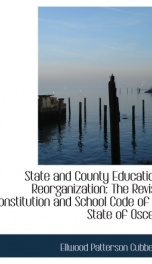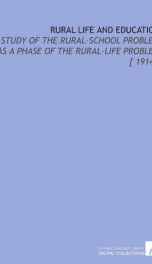Cubberley Ellwood Patterson

Ellwood Patterson Cubberley (1868 – 1941) was an American educator and author for which the Cubberley Community Center was named. He was also president of Vincennes University and held a number of senior administrative positions in education in the San Diego area in California. Cubberley was born in Andrews, Indiana. He graduated from Indiana University in 1891, he then served as president of Vincennes University from 1891 until 1896, and was then superintendent of schools from 1896 until 1898 in San Diego. He then went on to join the faculty of Stanford, and gained a Ph.D. from Columbia University in 1905, before returning to the faculty in 1906 as professor of education and then later in 1917 the dean of the school of education, until he retired in 1933. During his career, he maintained a view of education as an instrument of social engineering, a view that created some controversy.[1] Cubberley published a total of 30 works during his life, including: Cubberley was perhaps the most significant educational administrator of his day. At the outset of Cubberley's career, school administration was thought of as a set of general principles without any conception of theoretical or scientific plans. There were no formal textbooks from which to teach educational administration to students. Educational administrators had no place to learn better practices and, as such, learned solely from experience. Indeed, educational administration posts were often political plums requiring little, if any, formal training. Most universities lacked education departments.Cubberley pioneered the use of the school survey as an instrument to improve education, in his reports on the Baltimore, Maryland; New York City; Oakland, California; Portland, Oregon; and Salt Lake City, Utah schools. In conducting surveys, he applied an integrated theory of organization, administration, and teaching, to assess the strengths and weaknesses of individual schools. He used the latest statistical and quantitative methods. His surveys were significant steps down a new road toward improving school functions.Cubberley's legacy has been decidedly mixed. Since his death in 1941, Cubberley's celebrationist historical account has been attacked, perhaps most memorably by Lawrence Cremin's The Wonderful World of Ellwood Patterson Cubberley (1965). Historiographically, some academicians have used Cubberley's methodology as a cautionary tale and termed his approach anachronistic and evangelistic. In a similar vein, Cubberley's administration stances have been attacked as sexist and autocratic. Regardless, Cubberley's historical account was a Promethean achievement, in light of the then-existing state of knowledge. And, without a doubt, Cubberley's views on empirical research in education and increased efficiency in public schools have remained dominant paradigms in contemporary public education.
do you like this author?
What readers are saying
What do you think? Write your own comment on this book!
write a commentWhat readers are saying
What do you think? Write your own comment on this author!
write a commentBook list

the portland survey a textbook on city school administration based on a concret
Series:
Unknown
Year:
Unknown
Raiting:
4/5
Show more
add to favoritesadd In favorites

the certification of teachers a consideration of present conditions with sugge
Series:
Unknown
Year:
Unknown
Raiting:
4/5
Show more
add to favoritesadd In favorites

state and county educational reorganization the revised constitution and school
Series:
Unknown
Year:
Unknown
Raiting:
2.5/5
Originally published in 1914. This volume from the Cornell University Library's print collections was scanned on an APT BookScan and converted to JPG 2000 format by Kirtas Technologies. All titles scanned cover to cover and pages may include marks notations and other marginalia present in the original volume.
Show more
add to favoritesadd In favorites
Book list

the portland survey a textbook on city school administration based on a concret
Series:
Unknown
Year:
Unknown
Raiting:
4/5
Show more
add to favoritesadd In favorites

the certification of teachers a consideration of present conditions with sugge
Series:
Unknown
Year:
Unknown
Raiting:
4/5
Show more
add to favoritesadd In favorites

state and county educational reorganization the revised constitution and school
Series:
Unknown
Year:
Unknown
Raiting:
2.5/5
Originally published in 1914. This volume from the Cornell University Library's print collections was scanned on an APT BookScan and converted to JPG 2000 format by Kirtas Technologies. All titles scanned cover to cover and pages may include marks notations and other marginalia present in the original volume.
Show more
add to favoritesadd In favorites

school organization and administration a concrete study based on the salt lake
Series:
Unknown
Year:
Unknown
Raiting:
3.5/5
Originally published in 1917. This volume from the Cornell University Library's print collections was scanned on an APT BookScan and converted to JPG 2000 format by Kirtas Technologies. All titles scanned cover to cover and pages may include marks notations and other marginalia present in the original volume.
Show more
add to favoritesadd In favorites

school funds and their apportionment a consideration of the subject with refere
Series:
Unknown
Year:
Unknown
Raiting:
3.5/5
Show more
add to favoritesadd In favorites

school funds and their apportionment a consideration of the subject with refer
Series:
Unknown
Year:
Unknown
Raiting:
3.5/5
Show more
add to favoritesadd In favorites

rural life and education a study of the rural school problem as a phase of the
Series:
Unknown
Year:
Unknown
Raiting:
5/5
Originally published in 1914. This volume from the Cornell University Library's print collections was scanned on an APT BookScan and converted to JPG 2000 format by Kirtas Technologies. All titles scanned cover to cover and pages may include marks notations and other marginalia present in the original volume.
Show more
add to favoritesadd In favorites

report of a survey of the organization scope and finances of the public school
Series:
Unknown
Year:
Unknown
Raiting:
4/5
Show more
add to favoritesadd In favorites

a brief history of education a history of the practice and progress and organiz
Series:
Unknown
Year:
Unknown
Raiting:
3/5
Show more
add to favoritesadd In favorites

The History of Education; educational practice and progress considered as a phase of the development and spread of western civilization
Series:
Unknown
Year:
Unknown
Raiting:
2.5/5
Show more
add to favoritesadd In favorites
What readers are saying
What do you think? Write your own comment on this author!
write a commentif you like Cubberley Ellwood Patterson try:
readers also enjoyed
What readers are saying
What do you think? Write your own comment on this author!
write a commentGenre
if you like Cubberley Ellwood Patterson try:
readers also enjoyed
Do you want to exchange books? It’s EASY!
Get registered and find other users who want to give their favourite books to good hands!

